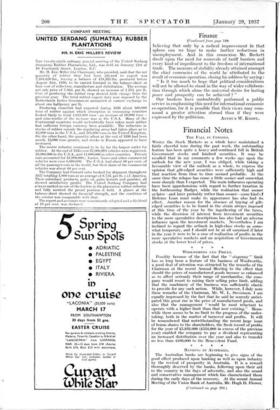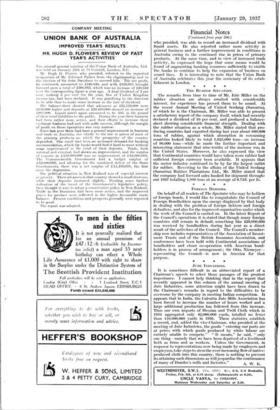Financial Notes
THE FALL IN CONSOLS.
WHILE the Stock Markets as a whole have maintained. a fairly cheerful tone during the past week, the outstanding feature has been quite a heavy and continued fall in British Government stocks and kindred securities. It may be recalled that in my comments a few weeks ago upon the outlook for the new year, I was obliged, while taking a favourable view of the outlook as a whole, to express the opinion that gilt-edged securities were sufficiently high and that reaction from time to time seemed probable: At the same time the relapse has come a little sooner and somewhat more sharply than I expected. The main influences operating have been apprehensions with regard to further taxation in the forthcoming Budget, while the realisation that sooner or later—and later probably rather than sooner—some kind cf Defence Loan must make its appearance has also had its effect. Another reason for the absence of buying of gilt- edged securities is to be found in the strain always imposed at this time of the year by the ingathering . of the taxes, while the diversion of interest from investment securities to the more speculative descriptions has also had an adverse influence upon the investment markets. Nevertheless I am inclined to regard the setback in high-class stocks as some- what temporary, and I should not be at all surprised if later in the year it were to be a ease of realisation of profits in the more speculative markets and an acquisition of Government stocks at the lower level of prices.
* *
WOOLWORTHS AND PRICES.
Possibly because of the fact that the " sixpenny " limit has so long been a feature of the business of Woolworths, a good deal of attention was attracted by the remarks of the Chairman at the recent Annual Meeting to the effect that should the prices of manufactured goods become so enhanced as to affect seriously their range of merchandise, the com- pany would resort to raising their selling price limit, adding that the machinery of the business was sufficiently elastic to provide for any such action. While, however, I duly note these remarks of the Chairman, Mr. W. L. Stevenson, I aril equally impressed by the fact that he said he scarcely antici- pated' this great rise in the price of Manufactured goods, and also that the management " would be most reluctant to operate with a higher limit than that now existing." Mean- while there seems to be no limit to the progress of the under- taking, both in the matter of turnover and profits. It will be remembered that notwithstanding the recent large issue of bonus shares to the shareholders, the fresh:record of profits for the year of £5,832,000 (i534,000 in excess of the previous year) enabled the company to pay a dividend representing an increased distribution over the year and also to transfer no less than £100,000 to the Benevolent Fund.
*
BANKING IN AUSTRALIA.
The Australian banks are beginning to give signs of the good effect produced upon banking as well as upon industry by the revival of prosperity in Australia. It is a reward thoroughly deserved by the banks, following upon their aid to the country in the days of adversity, and also the sound and.conservative management which. has characterised them during the early days of the recovery. At the recent Annual Meeting of the Union Bank of Australia, Mr. Hugh D. Flower, (Continued on page 202.)
Financial Notes
(Continued from page 200.) who presided, was able to record an increased dividend with liquid assets. He also reported rather more activity in general business and a further improvement in conditions in Australia owing to the continued rise in prices of primary products. At the same time, and in view of increased trade activity, he expressed the hope that some means would be found of augmenting banking resources sufficiently to-enable the banks to continue to help the expansion of business on sound lines. It is interesting to note that the Union Bank of Australia celebrates this year the centenary of its estab- lishment in London.
* * * * THE RUBBER SITUATION.
The remarks from time to time of Mr. Eric Miller on the rubber situation are always awaited with considerable interest, for experience has proved them to be sound. At the recent Annual Meeting of United Serdang (Sumatra), of which he is the Chairman, Mr. Miller was able to present a satisfactory report of the company itself, which had recently declared a dividend of 10 per cent. and produced a balance- sheet showing considerable financial strength. Dealing with the rubber situation as a whole, Mr. Miller stated that pro- ducing countries had exported during last year about 860,000 tons of rubber, against which absorption in consuming countries looked likely to total 1,025,000 tons—an increase of 90,000 tons—while he made the further important and interesting statement that nine-tenths of the increase was in the United States. Moreover, he also expressed the. view that Continental countries would have taken more rubber had sufficient foreign currency been available. It appears that the motor industry continued to be by far the largest outlet for rubber. Reverting to the affairs of the United Serdang (Sumatra) Rubber Plantations Ltd., Mr. Miller stated that the company had forward sales booked for shipment thrOugh- out 1937 totalling 1,800 tons at an average of 8.72d. per lb.
* * * * FOREIGN DEBTORS.
On behalf of all readers of The Spectator who may be holders of foreign bonds, I would like to congratulate the Council of Foreign Bondholders upon the energy displayed by that body in dealing with the problem of foreign debtors and foreign defaulters, and also for the improved organisation under which the work of the Council is carried on. In the latest Report of the Council's operations it is stated that though many foreign countries still remain in default, something like £20,000,000 was received by bondholders during last year as a direct result of the activities of the Council. The Council's member- ship now includes representatives of the Association of Invest- ment Trusts and of the British Insurance Association, and conferences have been held with Continental associations of bondholders and closer co-operation with American bond- holders is in process of arrangement; Sir Otto Niemeyer— representing the Council—is now in America for that purpose.
* * * * JUTE INDUSTRIES.
It is sometimes difficult in an abbreviated report of a Chairman's speech to select those• passages of the greatest importance. I cannot help thinking that in the report that recently appeared in this column of the annual meeting of Jute Industries, some attention might have been drawn to the Chairman's remarks in regard to the difficulties to be overcome by the company in meeting Indian competition. It appears that in India, the Calcutta Jute Mills Association has been forced to increase the number of hours- worked and a large additional production has followed from this increase. Thus our own imports of Hessian and Twill Cloth which in 1934 aggregated only 42,000,000 yards, totalled no fewer than 110,000,000 yards in 1936. These statistics establish a record, and, added the vice-Chairman, who presided at the meeting of Jute Industries, the goods " entering our ports are at prices with which goods produced by white labour are entirely unable to compete." " It means," he said, " only one thing—namely that we have been deprived of a livelihood both as firms and as workers. Unless the - Government, in response to representations now being made by-employers and employees, take stepsto stem the ever-increasing flow of native- produced cloth into this country, there is nothing to prevent its attaining such dimensions as will jeopardise the continuance
of many of Dundee's mills and factories." A. W. K.























































 Previous page
Previous page